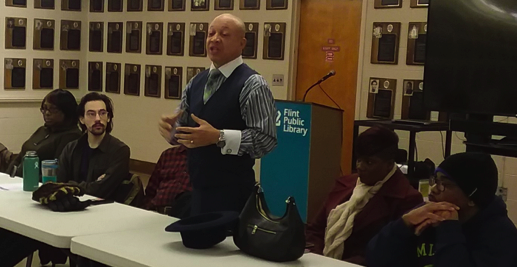By Luther Houle
New Flint Mayor Sheldon Neeley told residents face-to-face at this month’s Flint Neighborhoods United (FNU) meeting that he will not tolerate those who see Flint as “a garbage can” and that he is sending out a team of blight restriction enforcers to address blighted areas.
He also “deputized” the 40-plus attendees to be “agents of change” to convince people who have not “opted in” for water pipe replacement to do so as soon as possible.
 The Dec. 7 meeting also featured a presentation by Jason Wilson, vice president of student success at Mott Community College (MCC). Wilson introduced the college’s strategic plan for 2019-2021. More than 40 of Flint’s community leaders, city officials, and nonprofit representatives met at 9:30 a.m. Dec. 7 at the Flint Public Library.
The Dec. 7 meeting also featured a presentation by Jason Wilson, vice president of student success at Mott Community College (MCC). Wilson introduced the college’s strategic plan for 2019-2021. More than 40 of Flint’s community leaders, city officials, and nonprofit representatives met at 9:30 a.m. Dec. 7 at the Flint Public Library.
FNU meetings usually begin with a 15-30 minute session where folks take turns sharing updates from their organizations for the month. This time, the meeting had only just begun when Mayor Neeley appeared to introduce himself and meet the FNU team.

Mayor Sheldon Neeley addressing Flint Neighborhoods United (Photo by Luther Houle)
After greeting the group, Neeley said, “The reason I come before you like this… I much prefer not to have a monologue, but a dialogue.”
Neeley briefly mentioned his effort to reorganize the Department of Public Works (DPW). He said, “It’s a huge department and no one person can effectively run that department by themselves.”
He explained he has divided the DPW into two portions to separately focus on utilities and roads. Neeley said Rob Bincsik, the previous DPW director, will be in charge of utilities, and new appointee John Daly will be in charge of roads.
Neeley greeted the City and State police at the meeting before recognizing Phil Hart, Neeley’s pick as the city’s interim police chief.
The mayor then went on to address blight, usually a hot topic at FNU meetings.
“We’re restructuring the way we engage with blight in the community,” Neeley said. “Blight – and the illegal activities around that – will be enforced strongly. Anyone who wants to use the city of Flint as a garbage can… we’re going to change their mind very quickly.”
He added a group of 10 Neighborhood Safety Officers (NSO) will be issuing citations to enforce blight restrictions.
He next mentioned the city is “woefully behind” regarding several reports due by the end of the month, including audits and Environmental Protection Agency (EPA) reports. To deal with that, he said the city has brought in several outside firms to help with the audit, and he’s been discussing the EPA reports with the federal government which has left him “very excited” about what needs to be done to handle the situation.
Between four thousand to five thousand homes have been unresponsive to the city regarding water testing and pipe replacement,” Neeley said. He “deputized” every person in the room as an “agent of change.”
He advised that people encourage their neighbors to respond to the city immediately, so that water test reports can be completed for the EPA by the end of the month.
Neeley finished up by taking questions from the audience before allowing the meeting to return to its scheduled agenda.
To summarize the challenges facing the city and his administration moving forward, Neeley said,
“The bad news is: it’s going to be like threading a needle by moonlight. But the good news is: I have a thread, I have a needle, and I have moonlight.”
The next presenter was Jason Wilson, vice president for student success at MCC. He explained that he is new to the area, visiting FNU for the first time, and wanted to talk about the new MCC strategic plan.
He said MCC has more than 10,000 credit students–meaning students pursuing a degree or certificate–as well as 2600 noncredit students.
Wilson announced MCC is in the top 10 community colleges in the nation as awarded by the 2021 Aspen Prize for Community College Excellence. While he did not share the amount awarded, Wilson said winners receive up to $1 million.
Wilson offered a a diagram to show sources of MCC funding: of the $73.5 million budget
- 44 percent comes from students as tuition and fees.
- 26% comes from property taxes
- 23% comes from state appropriations
- 7% comes from investments and other sources.

Jason Wilson (Photo by Luther Houle)
Wilson’s presentation also highlighted some improvements MCC is planning, from increasing student retention and employee satisfaction, to opening the new family life center Jan 1. A full list of improvements can be found at the Mott website, www.mcc.edu/strategic-plan/index.shtml.
One listener asked what kind of economic impact MCC has on the City of Flint. Wilson used healthcare as an example. He said MCC is well known for producing many healthcare graduates who give back to the economy. “We graduate 60 to 70 nurses each year. All of them get jobs in this area,” he said.
Wilson recommended listeners read the whole MCC strategic plan, which can be found at the link above. He says it details the institutional priorities, and the many goals MCC has set through 2021.
EVM Staff Writer Luther Houle can be reached at lutherbhoule@gmail.com.


You must be logged in to post a comment.